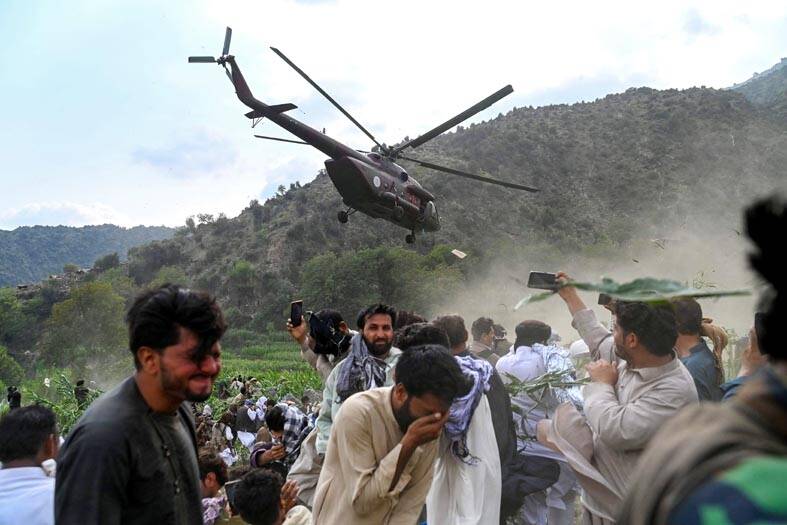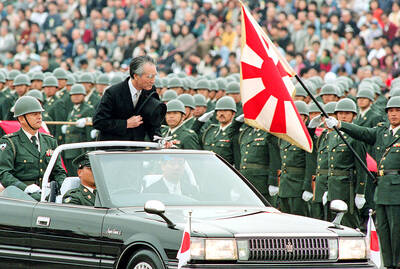Rescuers in Afghanistan yesterday were trying to reach isolated villages in the eastern region of Kunar, the epicenter of an earthquake that killed 1,124 people, according to the Afghan Red Crescent Society.
At least 3,251 people have been injured and more than 8,000 houses have been destroyed in the disaster, the group said.
Rescue operations were carried out in four villages in Kunar on Monday after the quake struck and efforts were now being focused on reaching more remote mountain areas, said Ehsanullah Ehsan, the provincial head of disaster management.

Photo: AFP
“We cannot accurately predict how many bodies might still be trapped under the rubble,” Ehsan said. “Our effort is to complete these operations as soon as possible and to begin distributing aid to the affected families.”
Mountainous terrain and inclement weather have hindered rescuers reaching remote areas along the Pakistani border where the earthquake flattened mudbrick homes.
Gaining access for vehicles on the narrow mountain roads was the main obstacle for relief work, Ehsan said, adding that machinery was being brought in to clear roads of debris.
A line of ambulances was on the damaged mountain road trying to reach Kunar villages yesterday, as helicopters flew in, bringing aid supplies and taking the injured to hospitals, a witness said.
Some of those injured have been transferred to hospitals in Kabul and the adjacent province of Nangarhar, Ehsan said.
Thousands of children were at risk, the UN Children’s Fund said yesterday.
UNICEF said it was sending medicines, warm clothing, tents and tarpaulins for shelter, and hygiene items such as soap, detergent, towels, sanitary pads and water buckets.
“Our response focuses on addressing urgent needs across health, safe water, sanitation, nutrition, child protection, temporary shelter, and psychosocial support to ensure that children and families receive life-saving assistance as quickly as possible,” UNICEF’s representative in Afghanistan Tajudeen Oyewale said in a statement.
Taliban soldiers were deployed in the area, providing help and security.
The disaster has further stretched the war-torn nation’s Taliban administration, already grappling with a sharp drop in foreign aid and deportations of hundreds of thousands of Afghans by neighboring nations.
“National and international organizations are present in the area, have organized their assistance, and, God willing, aid will be distributed in an orderly manner,” Ehsan said.
Rescue teams and authorities were trying to dispose of animal carcasses quickly so as to minimize the risk of contamination to water resources, a UN official said.
“Damaged roads, ongoing aftershocks, and remote locations of many villages severely impede the delivery of aid,” the WHO said in a situation update. “The pre-earthquake fragility of the health system means local capacity is overwhelmed, creating total dependence on external actors.”
Afghanistan has been badly hit by US President Donald Trump’s decision in January to cut funding to its humanitarian arm USAID and reductions in other foreign aid programs.
Crises elsewhere in the world, along with donor frustration over the Taliban’s policies toward women and curbs on aid workers, have been a factor in funding cuts, diplomats and aid officials said.
Humanitarian officials said the shrinking of funding was hampering the response to the quake.
In the wake of the latest disaster, the UK allocated £1 million (US$1.34 million) to support the efforts of the UN and the International Red Cross in delivering critical healthcare and emergency supplies to affected Afghans.
China said it was ready to provide disaster relief assistance “according to Afghanistan’s needs and within its capacity,” while India delivered 1,000 family tents to Kabul and was moving 15 tonnes of food supplies to Kunar.

The Venezuelan government on Monday said that it would close its embassies in Norway and Australia, and open new ones in Burkina Faso and Zimbabwe in a restructuring of its foreign service, after weeks of growing tensions with the US. The closures are part of the “strategic reassignation of resources,” Venezueland President Nicolas Maduro’s government said in a statement, adding that consular services to Venezuelans in Norway and Australia would be provided by diplomatic missions, with details to be shared in the coming days. The Norwegian Ministry of Foreign Affairs said that it had received notice of the embassy closure, but no

A missing fingertip offers a clue to Mako Nishimura’s criminal past as one of Japan’s few female yakuza, but after clawing her way out of the underworld, she now spends her days helping other retired gangsters reintegrate into society. The multibillion-dollar yakuza organized crime network has long ruled over Japan’s drug rings, illicit gambling dens and sex trade. In the past few years, the empire has started to crumble as members have dwindled and laws targeting mafia are tightened. An intensifying police crackdown has shrunk yakuza forces nationwide, with their numbers dipping below 20,000 last year for the first time since records

EXTRADITION FEARS: The legislative changes come five years after a treaty was suspended in response to the territory’s crackdown on democracy advocates Exiled Hong Kong dissidents said they fear UK government plans to restart some extraditions with the territory could put them in greater danger, adding that Hong Kong authorities would use any pretext to pursue them. An amendment to UK extradition laws was passed on Tuesday. It came more than five years after the UK and several other countries suspended extradition treaties with Hong Kong in response to a government crackdown on the democracy movement and its imposition of a National Security Law. The British Home Office said that the suspension of the treaty made all extraditions with Hong Kong impossible “even if

Former Japanese prime minister Tomiichi Murayama, best known for making a statement apologizing over World War II, died yesterday aged 101, officials said. Murayama in 1995 expressed “deep remorse” over the country’s atrocities in Asia. The statement became a benchmark for Tokyo’s subsequent apologies over World War II. “Tomiichi Murayama, the father of Japanese politics, passed away today at 11:28am at a hospital in Oita City at the age of 101,” Social Democratic Party Chairwoman Mizuho Fukushima said. Party Secretary-General Hiroyuki Takano said he had been informed that the former prime minister died of old age. In the landmark statement in August 1995, Murayama said